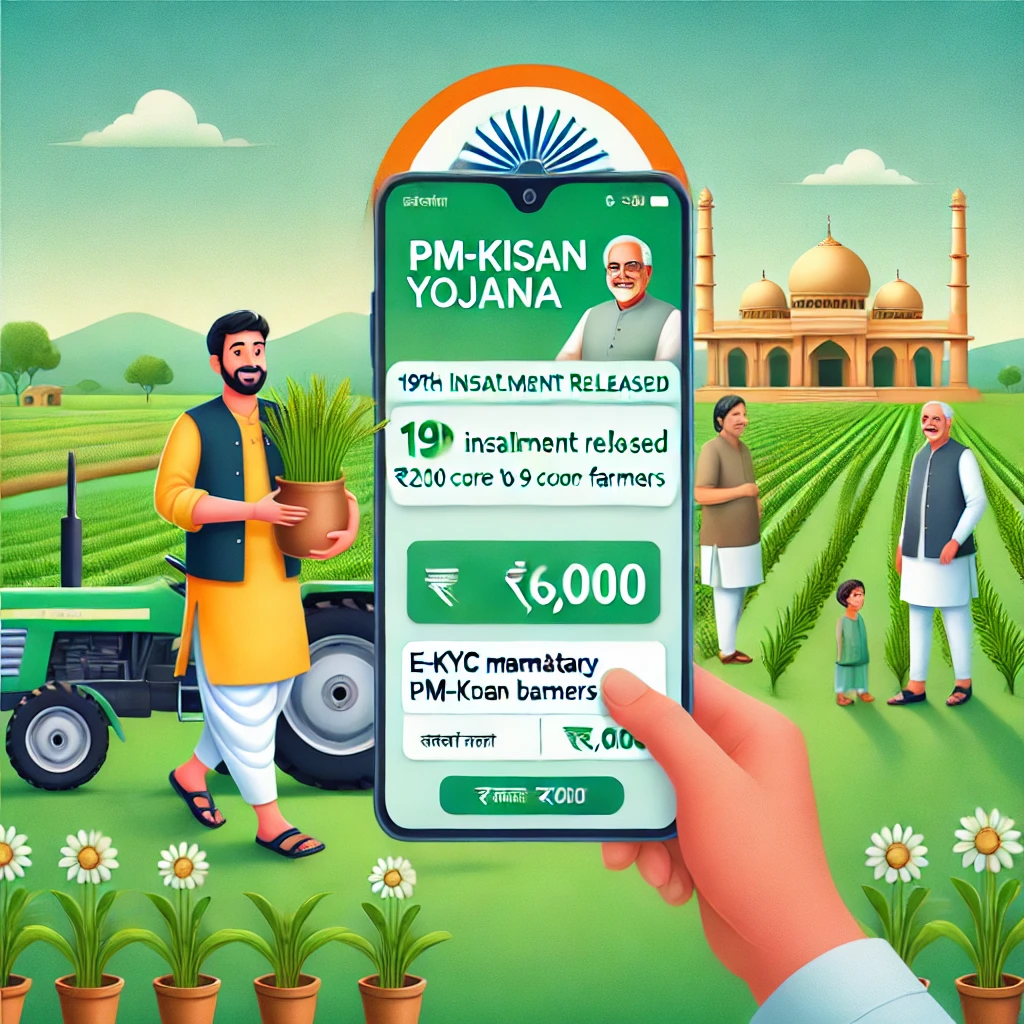Introduction
The Pradhan Mantri Kisan Samman Nidhi (PM-KISAN) Yojana is one of the most significant welfare schemes launched by the Government of India to support farmers financially. It was announced in February 2019 as part of the Interim Budget by then Finance Minister Piyush Goyal. This initiative aims to provide direct income support to farmers, ensuring financial stability and promoting agricultural growth.
Announcement and Objectives
PM-KISAN was formally launched on 24th February 2019 by Prime Minister Narendra Modi in Gorakhpur, Uttar Pradesh. The key objectives of this scheme include:
- Providing direct income support to farmers.
- Ensuring financial security for small and marginal farmers.
- Strengthening agriculture-based livelihoods.
- Boosting rural economic growth.
Key Features of PM-KISAN
- Financial Assistance: Eligible farmers receive ₹6,000 per year in three equal installments.
- Beneficiary Category: Small and marginal farmers owning up to 2 hectares of land initially; later extended to all farmers irrespective of landholding.
- Direct Transfer: The amount is directly credited to the bank accounts of beneficiaries.
- Implementation: The scheme is fully funded by the central government, with no financial burden on states.
Constitutional Aspect of PM-KISAN
PM-KISAN is backed by several constitutional provisions that empower the government to implement such welfare schemes:
- Directive Principles of State Policy (DPSP): Article 38 (ensuring social justice) and Article 39(b) & (c) (equitable distribution of resources) form the basis of this scheme.
- Agriculture as a State Subject: Under Entry 14 of the State List, agriculture is a state matter; however, Entry 20 of the Concurrent List allows the Union Government to introduce schemes for economic and social planning.
- Right to Livelihood: Though not explicitly mentioned in the Constitution, Article 21 (Right to Life) has been interpreted by the Supreme Court to include the right to livelihood, which PM-KISAN supports.
- Economic Justice (Preamble): The scheme aligns with the socialistic approach envisioned in the Preamble by reducing income disparity among farmers.
Recent Updates on PM-KISAN
On February 24, 2025, Prime Minister Narendra Modi released the 19th installment of PM-KISAN from Bhagalpur, Bihar. This installment disbursed approximately ₹22,000 crore directly into the bank accounts of 9.8 crore farmers across the country. Notably, around 75 lakh farmer families in Bihar benefited from this installment, receiving a total of ₹1,600 crore. Since its inception, over ₹3.7 lakh crore has been transferred directly to farmers’ accounts under the scheme.
To ensure continued benefits, the government has mandated e-KYC for all PM-KISAN registered farmers. Farmers can complete this process through OTP-based e-KYC via the PM-KISAN portal or mobile app, biometric-based e-KYC at Common Service Centers (CSCs), or face authentication-based e-KYC.
Impact of PM-KISAN on Farmers
Since its inception, PM-KISAN has had a significant impact on the agricultural community:
- Improved Financial Stability: Timely financial aid helps farmers purchase seeds, fertilizers, and other essentials.
- Reduction in Rural Debt: Farmers can reduce dependency on informal loans with high interest.
- Boost to Rural Economy: Increased purchasing power strengthens local markets and the agricultural supply chain.
- Enhanced Agricultural Productivity: Support for farmers encourages better farm management and investment in modern techniques.
Challenges and Criticism
Despite its success, PM-KISAN faces several challenges:
- Exclusion Errors: Some eligible farmers remain unregistered due to administrative hurdles.
- Delay in Payments: Technical issues and verification delays slow the fund transfer process.
- No Coverage for Tenant Farmers: The scheme benefits landowners but excludes tenant farmers and sharecroppers.
Conclusion
PM-KISAN Yojana is a landmark initiative that provides direct financial support to millions of farmers, ensuring economic stability and agricultural development. While challenges remain, continuous improvements and better implementation can make it more inclusive and effective. With its constitutional backing and socio-economic impact, PM-KISAN is a step toward a prosperous and self-reliant agricultural sector in India.
Also Read -:

